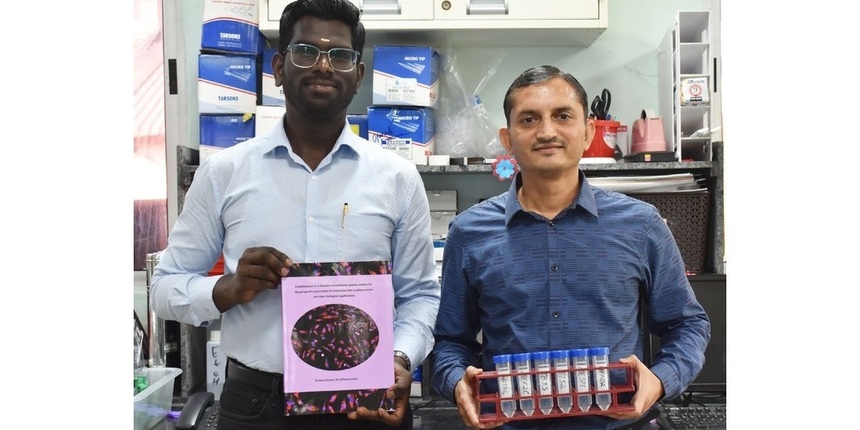IIT Guwahati researchers develop cardiac proteins to fix damaged heart
Arpita Das | February 20, 2023 | 05:27 PM IST | 2 mins read
By exposing skin cells to the proteins, IITG researchers could ‘reprogram’ the cells and make them have the characteristics of heart cells.

NEW DELHI: The Indian Institute of Technology (IIT) Guwahati research team has developed a ‘Recombinant Protein Toolbox’ comprising six special proteins, which can be used to convert healthy skin cells or any somatic cells from an adult human body into heart cells, specifically cardiomyocytes.
The heart cells created using this toolbox can have the same function as the original heart cells and can be used to regenerate damaged heart tissues. Importantly, this toolbox can facilitate the generation of autologous heart cells in a lab.
Also Read | AICTE launches BTech Electronics (VLSI design and technology), diploma in IC manufacturing
The research team is led by Dr Rajkumar P Thummer, Assistant Professor, Department of Biosciences and Bioengineering, along with his research scholar Krishna Kumar Haridhasapavalan
The IIT Guwahati team has successfully produced cell-permeant recombinant proteins that can convert skin cells to heart cells. A recombinant protein is a desired protein produced by engineered host cells in a laboratory using recombinant DNA technology.
By exposing skin cells to these proteins, the IIT Guwahati researchers could ‘reprogram’ the cells and make them have the characteristics of heart cells. This process can be seen as ‘re-wiring’ the genetic program of the skin cells to be more like that of heart cells.
Also Read | Assam: Y20 Summit to incorporate ideas of youths in policy proposals; Nearly 12,000 students participating
To validate the biological activity of the recombinant fusion proteins, the team has collaborated with Dr Vishwas Kaveeshwar from the Central Research Laboratory at SDM College of Medical Sciences and Hospital in Dharwad, Karnataka.
Explaining the details of their work, Dr Rajkumar P Thummer, Assistant Professor, Department of Biosciences and Bioengineering, IIT Guwahati said, “Recombinant protein-based cellular reprogramming is a promising alternative and the safest approach among other available non-integration approaches. As these proteins do not modify or alter the genome of the cells, the cells generated using this reprogramming approach have a high cell therapeutic value. Several challenges associated with the heterologous production of these recombinant proteins have been addressed in our six research publications in different journals.”
Also Read | IIT Guwahati BioNEST hosts second edition of Kickstart 2.0 industry conclave
Krishna Kumar Haridhasapavalan, Research Scholar at IIT Guwahati said, “The recombinant proteins can be delivered to target sites without the need of any harmful reagents. In addition to cardiac repair, these proteins can be studied for their role in various cancers as suppressors or promotors of tumour growth.”
The researchers have recently shared their results on the development of cell- and nucleus-penetrating versions of six cardiac reprogramming transcription factors in numerous international peer-reviewed journals including Molecular Biotechnology, Applied Microbiology and Biotechnology, Bioprocess and Biosystems Engineering, Current Research in Biotechnology, Healthcare Research and Related Technologies Proceedings from NERC 2022, Scientific Reports, and Advances in Experimental Medicine and Biology.
Follow us for the latest education news on colleges and universities, admission, courses, exams, research, education policies, study abroad and more..
To get in touch, write to us at news@careers360.com.